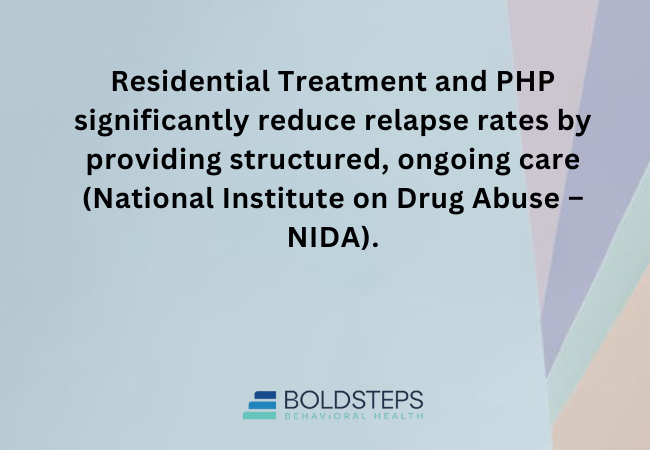Seeking treatment for addiction and mental health challenges is a crucial step toward recovery. However, choosing the right level of care can be overwhelming. Two of the most comprehensive treatment options are Partial Hospitalization Programs (PHP) and Residential (Inpatient) Treatment. While both provide intensive care, they differ in their living arrangements, structure, intensity, and flexibility.
At Bold Steps New Hampshire, we offer a full range of treatment options, including Partial Hospitalization Programs, Residential Treatment, Intensive Outpatient Programs, Outpatient Treatment Programs, Addiction Treatment Programs, Dual Diagnosis Treatment Programs, Medical Detox Programs, and Virtual Treatment Programs. Each program is tailored to meet the specific needs of individuals in recovery.
This guide will explore the differences between PHP and Residential Treatment, their benefits, and how to determine which one is best for you or your loved one.
What is Residential (Inpatient) Treatment?
Residential treatment, also known as inpatient rehab, is an intensive 24/7 program where individuals live at the treatment facility for a set period, typically 30, 60, or 90 days. It is the highest level of care outside of hospitalization and is ideal for individuals who require constant supervision, medical care, and a highly structured recovery environment.
Key Features of Residential Treatment
- Individuals stay at the treatment facility full-time and have no access to outside triggers.
- 24/7 medical supervision ensures safety, especially for those undergoing withdrawal or experiencing severe mental health symptoms.
- A structured daily schedule includes therapy, group sessions, wellness activities, and life skills training.
- Peer support is available in a safe, substance-free environment where individuals can build relationships with others in recovery.
- Many residential programs include Medical Detox for those needing supervised withdrawal management.
- Provides an immersive recovery experience, helping individuals develop strong coping mechanisms before transitioning to outpatient care.
Residential treatment is designed for those who need full-time care and structured therapy to break free from addiction and mental health struggles.
What is a Partial Hospitalization Program (PHP)?
A Partial Hospitalization Program (PHP) is an intensive structured treatment program that provides daytime therapy and medical support while allowing individuals to return home in the evenings. PHP is often a step down from residential treatment or an alternative to inpatient rehab for those who need a high level of care but can maintain stability outside of the facility.
Key Features of PHP
- Individuals attend treatment for 5-7 hours per day, five to six days per week.
- Provides medical and psychiatric support, including medication management and mental health therapy.
- Includes individual therapy, group therapy, family counseling, and relapse prevention training.
- Offers Dual Diagnosis Treatment, helping individuals with both addiction and mental health disorders.
- Allows more flexibility than inpatient rehab while still providing a highly structured recovery plan.
PHP is an effective choice for those who need comprehensive treatment but do not require full-time residential care.
Key Differences Between PHP and Residential Treatment
| Factor | Residential Treatment | Partial Hospitalization Program (PHP) |
|---|---|---|
| Living Situation | Individuals live at the facility full-time | Individuals return home each evening |
| Supervision & Medical Care | 24/7 medical and psychiatric supervision | Daytime medical and psychiatric support |
| Ideal For | Severe addiction, relapse risks, or those needing a structured environment | Individuals needing intensive therapy with more flexibility |
| Duration | Typically 30-90 days | Typically 4-6 weeks |
| Flexibility | Limited personal freedom due to 24/7 care | Allows individuals to maintain family, work, and personal responsibilities |
| Cost & Insurance | Higher cost due to full-time care and living expenses | More cost-effective, covered by many insurance plans |
Who Should Choose Residential Treatment?
Residential treatment is best for individuals who:
- Have severe substance use disorder (SUD) and require constant supervision.
- Need medical detox before starting therapy.
- Have experienced multiple relapses and struggle to maintain sobriety in outpatient settings.
- Lack a stable or supportive home environment.
- Have co-occurring mental health conditions (Dual Diagnosis) requiring intensive psychiatric care.
Benefits of Residential Treatment
- Provides a fully immersive recovery experience, free from outside triggers and distractions.
- Ensures constant access to medical and psychological care.
- Builds a strong foundation for long-term sobriety before transitioning to lower levels of care.
Who Should Choose a Partial Hospitalization Program (PHP)?
PHP is a strong alternative to residential treatment for individuals who:
- Need intensive therapy and medical support but do not require 24/7 supervision.
- Have a stable and supportive home environment that can support their recovery.
- Are transitioning from residential treatment and need continued structure.
- Have co-occurring mental health conditions that require comprehensive therapy and medication management.
- Need a cost-effective alternative to full-time inpatient rehab.
Benefits of PHP
- Offers intensive therapy while maintaining independence.
- Allows individuals to return home to their families each evening.
- Is more cost-effective than inpatient rehab while still providing structured care.
- Provides flexibility for those balancing work, school, or family responsibilities.
Transitioning from Residential to PHP to IOP
Many individuals step down from one level of care to another as they gain stability in recovery. A common treatment path includes:
- Residential Treatment (30-90 Days) – Full-time care for individuals needing a highly structured environment.
- Partial Hospitalization Program (PHP) (4-6 Weeks) – Intensive therapy while transitioning back to daily life.
- Intensive Outpatient Program (IOP) (6-12 Weeks) – Reduced treatment hours, allowing for more independence.
- Outpatient Treatment Program (OP) (Long-Term Support) – Ongoing therapy and relapse prevention for continued sobriety.
Each step provides progressive independence while maintaining strong support and accountability.
The Role of Virtual Treatment Programs
For individuals who cannot attend in-person treatment due to work, distance, or health concerns, Virtual Treatment Programs provide remote access to therapy, group counseling, and psychiatric care. These programs are beneficial for PHP participants who need additional flexibility in their treatment schedule.
Why Choose Bold Steps New Hampshire?
At Bold Steps New Hampshire, we are committed to helping individuals reclaim their lives from addiction and mental health challenges. We understand that every person’s journey to recovery is unique, which is why we offer personalized, evidence-based treatment plans to provide the best chance for long-term success.
What Sets Us Apart?
- Comprehensive Continuum of Care – We offer multiple levels of treatment, including Residential Treatment, Partial Hospitalization Programs (PHP), Intensive Outpatient Programs (IOP), Outpatient Treatment Programs, Medical Detox, and Virtual Therapy, ensuring a seamless transition through different stages of recovery.
- Dual Diagnosis Treatment – We specialize in treating co-occurring mental health disorders, ensuring individuals receive care for both addiction and underlying mental health conditions.
- Experienced Clinical Team – Our licensed therapists, medical professionals, and addiction specialists provide expert care, guidance, and support every step of the way.
- Flexible Treatment Options – Whether you need full-time residential care or a structured outpatient program, we tailor treatment to fit your needs.
- Holistic Approach to Recovery – We incorporate therapy, medical care, wellness activities, and relapse prevention strategies to help individuals build a strong foundation for lifelong sobriety.
- Support Beyond Treatment – Our aftercare programs and relapse prevention planning ensure that recovery continues long after treatment ends.
Your recovery matters to us. We are dedicated to providing a safe, compassionate, and structured environment where healing happens, and transformation begins.
Conclusion
Choosing between Residential Treatment and a Partial Hospitalization Program (PHP) is an important decision that depends on your personal circumstances, level of addiction, and support system.
- If you need full-time care, medical detox, or an immersive recovery experience, Residential Treatment may be the best option.
- If you require intensive therapy but prefer to return home each evening, PHP provides a highly structured program with added flexibility.
No matter where you are in your recovery journey, you don’t have to do this alone. At Bold Steps New Hampshire, we are here to support, guide, and empower you every step of the way. Our expert team is ready to help you take the next bold step toward a healthier, addiction-free life.
Your recovery starts today. Take the first step. Call Bold Steps New Hampshire at (603) 915-4223 to speak with a treatment specialist and explore the best program for you.
Frequently Asked Questions (FAQ)
What is the main difference between PHP and Residential Treatment?
The biggest difference is living arrangements and level of supervision. In Residential Treatment, individuals stay at the facility full-time and receive 24/7 supervision. In a Partial Hospitalization Program (PHP), individuals attend therapy for 5-7 hours per day but return home at night.
Who is PHP best suited for?
PHP is ideal for individuals who:
- Need intensive therapy and structured support but do not require 24/7 care.
- Have a stable home environment that supports recovery.
- Are transitioning from Residential Treatment and still need structured care.
- Have co-occurring mental health disorders and need Dual Diagnosis Treatment.
Who should consider Residential Treatment?
Residential Treatment is best for individuals who:
- Have a severe addiction or high risk of relapse.
- Need constant supervision and a structured recovery environment.
- Lack a stable or supportive home environment.
- Need medical detox before starting therapy.
How long do PHP and Residential Treatment programs last?
- Residential Treatment typically lasts 30-90 days, depending on the severity of addiction.
- PHP usually lasts 4-6 weeks, depending on individual progress.
Can PHP be as effective as Residential Treatment?
Yes, PHP can be just as effective as Residential Treatment, depending on the individual’s needs. PHP provides intensive therapy and medical support while allowing individuals to maintain more independence. Many people start with Residential Treatment and transition to PHP, then to Intensive Outpatient Programs (IOP), and finally Outpatient Treatment (OP) for long-term support.
Is PHP more affordable than Residential Treatment?
Yes, PHP is generally more cost-effective than Residential Treatment because individuals do not have to pay for overnight housing or 24/7 care. Many insurance providers cover both PHP and Residential Treatment, but coverage varies. Our team at Bold Steps New Hampshire can help verify your insurance and explore payment options.

